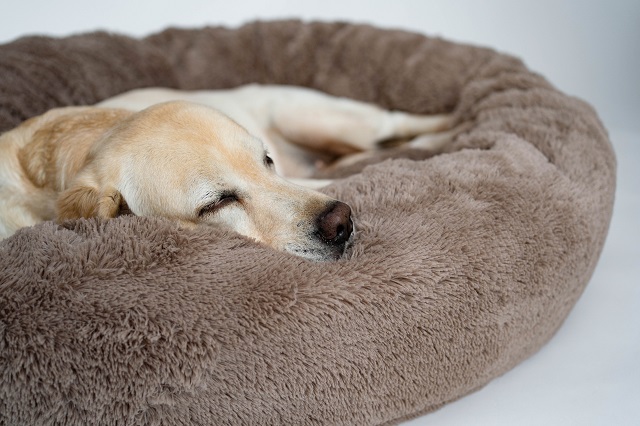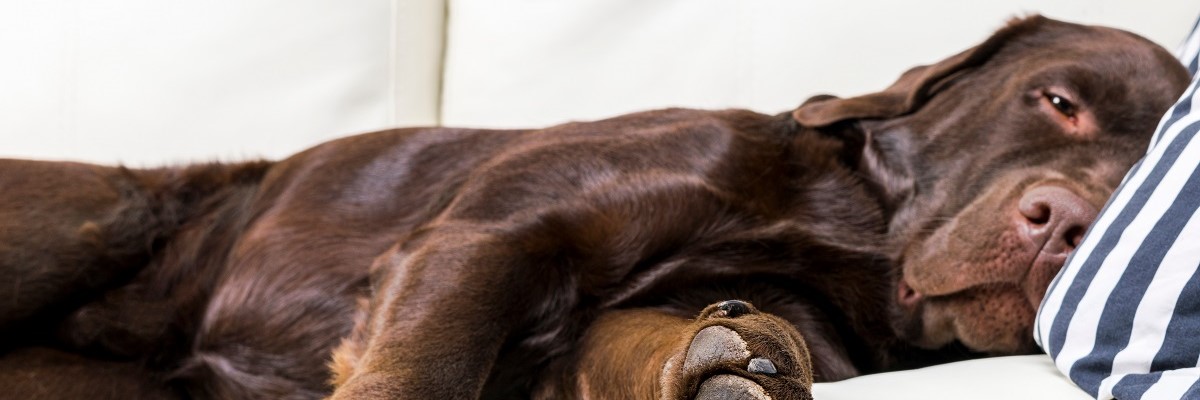Dogs that sleep 12 hours or more per day usually have nothing to worry about. An excessive sleep schedule of more than 12 hours per day may also indicate health problems. A veterinarian should be consulted about concerns regarding your Labrador’s sleeping habits.
How Much Sleep Do Labradors Need?
Labradors often surprise new owners with how much sleep they get. Additionally, owners who don’t understand how much sleep healthy Lab needs may miss signs of sleep problems. Labradors, on average, sleep 12-14 hours daily. This amount of sleep is typically accounted for by naps during the day and sleep at night. Puppies require even more sleep until about 12 weeks, averaging 18-20 hours daily.
A Labrador’s body and mind become tired with age, leading to them sleeping more. Different breeds and sizes of dogs need different amounts of sleep, but most Labrador owners can expect their pets to sleep for about half the day.
Dogs need sleep just as much as we do. A human sleep cycle lasts 24 hours. We are awake during the day and asleep at night. The deep sleep and REM phases of our sleep act as restorative phases. These phases allow our bodies to heal tissues and strengthen our immune systems. The effects of REM on the brain are beneficial for memory retention, development, and learning. As the brain exercises neural connections during REM sleep, it can maintain mental and physical well-being.
REM sleep only occupies about 10 percent of dogs’ snoozing time due to their irregular sleeping patterns. They often doze off while bored, so they wake up quickly and become alert again when something happens. Dogs need to sleep more total hours to compensate for the lost REM sleep.
When it comes to how much sleep a dog needs, its age plays an important role. Humans spend up to 25 percent of their sleep cycle in REM, reflecting our habit of staying awake during the day and going to sleep at night. As puppies nap throughout the day, they need a lot of sleep. Puppy’s nervous and immune systems need to develop adequately by sleeping 15 to 20 hours daily, just as infants do.
Labradors often require more sleep during their senior years and recover from exercise at a slower pace than their younger counterparts. Sometimes, chronic joint pain prevents Labradors from being active. If your Labrador is sleeping more and having difficulty standing and walking, it might develop arthritis.
Changes in my Labrador sleeping pattern?
You may begin to notice a change in your Labrador’s sleeping pattern when he spends more time sleeping or retreating to sleep than interacting with you. There may be various reasons for this. For example:
| Stress or boredom |
|---|
| Dogs react differently to stressful situations, with some sleeping more than others. Your Labrador may have trouble adjusting if the household routine has changed recently. The more time you spend interacting with your Lab, the better your results will be. Regular exercise is also important. |
| Pain |
|---|
| Despite being a very difficult scenario for owners to identify, this is a common cause of dogs sleeping more than usual. It is common for dogs to hide their pain from us because they are good at hiding pain. Many dogs, even those who are in pain, appear normal. A limp will not be evident, nor will there be yelling or crying. It is possible that pain is causing them to tire easily during activities they enjoyed previously or to seem less excited to go for walks. You may notice your dog sleeping more and acting grumpy or withdrawn. You should consult a veterinarian to determine the cause of your Labrador’s pain. There is no cure for arthritis (inflammation) in dogs, but there are methods to manage it effectively. In most cases, exercises, physiotherapy, weight loss, and joint supplements are used in combination. With the help of your veterinarian, you can design a treatment plan tailored to your Lab’s specific needs. |
| Increased Exercise |
|---|
| How much exercise does your Labrador get lately? Increasing exercise duration or intensity may lead to more sleep. The increase in exercise should be made slowly over several weeks. |
| Overweight |
|---|
| Overweight Labradors may have difficulty exercising as much and become tired more frequently. When they reduce their exercise levels, they gain more weight, leading to a vicious cycle! It may be difficult to assess your Lab’s weight accurately if you see them daily. Your veterinarian is typically able to weigh and score your Labrador visually. If weight loss is necessary, they can safely tell you how to accomplish it. Nutritionally balanced food should be provided to your Labrador. It is important to consult a veterinarian if you feed your Lab a diet that does not meet his nutritional requirements. A diet formulated for weight loss can sometimes boost weight loss in the short term. |
| Medical illnesses |
|---|
| Dogs with underlying illnesses might sleep more than usual, as they do when they are in pain. Many diseases can lead to lethargy and reduced activity. Diabetes It is possible for your Labrador to become less active or sleep more due to a hormonal imbalance. Changes in appetite, drinking, or bowel habits may also contribute to the disorder. Hypothyroidism Underactive thyroids may cause weight gain, sluggish metabolism, and lethargy. The condition can be treated very successfully with medications diagnosed through blood tests. When dogs with low energy levels begin treatment, they often see a huge change in their energy levels. Anemia A low level of red blood cells can pose a serious risk since they carry oxygen throughout the body. As a result, all tissues in the body receive less oxygen. Labradors with this condition may find it difficult to handle exercise and exertion and become sleepy. Leptospirosis In addition to other dogs, humans can also infect dogs with leptospirosis. There is a high risk of infection from this bacterial infection. Leptospirosis can also spread through water, soil, and the air. Warm climates are the most common setting for the disease. |
| False pregnancy |
|---|
| It is a condition that some dogs suffer from. It has been reported that Labradors with this problem sleep more than regular Labradors. Physical symptoms can be caused by hormonal imbalances as well as altered behavior. Most of these changes will resolve themselves over time. However, your vet may recommend effective medication for a Lab with a more severe condition. |
| Hydration & Nutrition |
|---|
| Labradors can become lethargic if they are dehydrated. Make sure they drink enough water. If your lab’s food does not contain enough nutrition, their energy levels may also decrease. As with humans, dogs may become drowsy after consuming carbohydrates. |

When To Get Help From Your Vet?
A veterinarian should be consulted if you observe any of the following warning signs.
| Your Labrador suddenly wakes up in a panic or is frightened. | Your Labrador is hard to wake up in the morning. |
| A long time passes without your Labrador drinking water or eating at mealtimes. | Changes in appetite, urination, defecation and increased sleep should also be observed. |
| They may fall asleep unexpectedly while playing. | Even when there is “something better to do,” like playtime, your Labrador will sleep. |
| Watch out for signs of anxiety, like staring at walls, feeling fearful, and feeling aggressive. | Your Labrador’s sleep habits have changed. |
Before you take your Lab to the vet, you might want to monitor their sleeping patterns and symptoms. When the vet examines your pet, they will likely ask you many questions, so be sure to answer them all. Make sure your Labrador is getting enough exercise and maintaining a healthy weight daily. If they continue sleeping excessively, you may want to consider taking them to be assessed.
Conclusion
It is probably not a problem if your Labrador sleeps a lot. However, if their sleeping patterns suddenly change, you should take them to the vet. You can keep them active and healthy by closely monitoring their daily routines.


